The Conversation (Sandra Chafouleas co-writes essay on impact on mental health resources with students returning to school)
Helping Special Education Teachers Under Stress
Penn State News (Tamika La Salle is mentioned as being part of the $4M IES grant)
Ben Bronz Academy/Foundation Welcomes New Executive Director
We-Ha (Neag School alumna Gail Lanza has been appointed executive director)
Free Academy Coaches School Leaders in Supporting Well-Being
 As school leaders head into this fall, ensuring that students as well as staff have social, emotional, and behavioral support is top of mind after an academic year marred by major disruptions — from losing valuable in-person classroom time to enduring the stress, uncertainty, and tragic loss caused by the pandemic.
As school leaders head into this fall, ensuring that students as well as staff have social, emotional, and behavioral support is top of mind after an academic year marred by major disruptions — from losing valuable in-person classroom time to enduring the stress, uncertainty, and tragic loss caused by the pandemic.
This summer, the Center for Education Policy Analysis, Research, and Evaluation (CEPARE) at UConn’s Neag School of Education convened more than 50 principals, assistant principals, educators, and school district leaders from across the state of Connecticut to coach them on fostering social, emotional, and behavioral well-being and safe school environments.
Held virtually, this Social, Emotional, and Behavioral (SEB) Leader Academy featured experts from UConn’s Collaboratory on School and Child Health (CSCH) sharing insights on strengthening policies and practices in support of SEB well-being at attendees’ schools going forward.
Two Neag School alumni — East Hartford superintendent Nathan Quesnel ’01 (ED), ’02 MA and Vernon superintendent Joseph Macary ’94 (ED), ’08 ELP, ’16 Ed.D. — designed the Academy in collaboration with CSCH Director and school mental health expert Sandra Chafouleas and CEPARE Director Morgaen Donaldson.
It is the first in a series of academies that will be offered free of charge to select school districts in Connecticut.
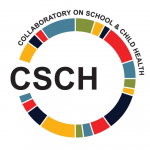 According to Chafouleas, who facilitated the SEB Leader Academy sessions with CSCH staff, the decision to focus with school leaders on the topic of SEB well-being was intentional.
According to Chafouleas, who facilitated the SEB Leader Academy sessions with CSCH staff, the decision to focus with school leaders on the topic of SEB well-being was intentional.
“SEB is a big worry and what we’re struggling with right now as to how to position schools to provide necessary supports,” says Chafouleas, who also serves a Board of Trustees Distinguished Professor of Educational Psychology at the Neag School.
“Education is a critical foundation to reducing each child’s net vulnerability, which drives long-term outcomes and intergenerational disparities,” she adds. “The things we do in schools can drive pathways to reducing these vulnerabilities, allowing schools to serve as assets.”
In a 2020 survey of school administrators across Connecticut, twice as many school administrators said that employee wellness had landed among their top three priorities during the pandemic, compared with before.
Physical and Emotional Safety
Over the course of two days in June, the SEB Leader Academy introduced participants to key issues and the latest research findings related to social, emotional, and behavioral well-being.
Among the findings CSCH shared were results from a 2020 survey of school administrators from across the state. Amid COVID-19, ensuring a safe environment in their schools emerged as a top worry for respondents. Survey participants also indicated that the pandemic had emphasized the need to address the wellness of their school employees. In fact, more than twice as many administrators said that employee wellness landed among their top three priorities during the pandemic, compared with before.
Academy facilitators also walked attendees through the holistic model known as the Whole School, Whole Community, Whole Child (WSCC). Designed by the Centers for Disease Control and Prevention, WSCC serves as a comprehensive and integrated framework for addressing health and well-being in schools.
Attendees discussed how WSCC could be used to enhance systems of support — by more effectively integrating efforts across academic, social, emotional, behavioral, and physical domains — and how they might then apply this knowledge in their own school settings.
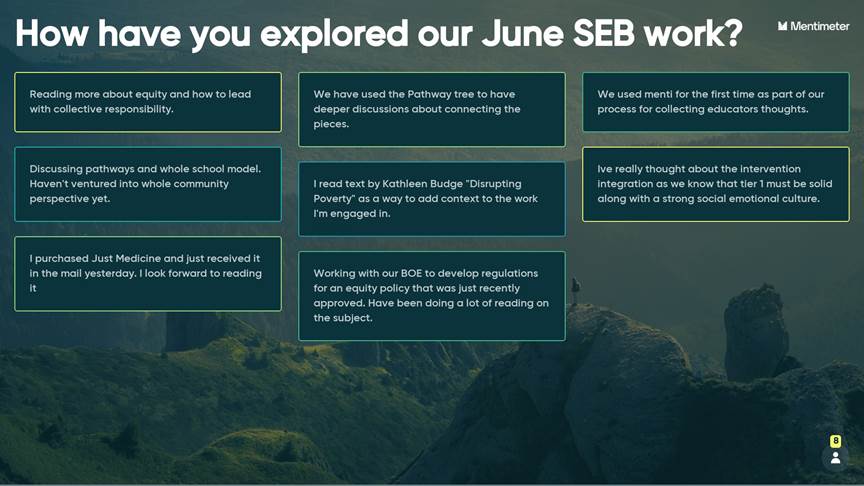
A follow-up session held this past week reunited the group for further interaction, including hearing how participants had so far begun to use what they had learned in the previous Academy sessions. For some, that included seeking out resources and literature on the concept of equity; others said they had initiated in-depth discussions on SEB within their districts or had worked toward developing an equity policy.
Chafouleas also spent part of the August session talking about common ways in which individuals of different age ranges may react to enduring trauma. For instance, while adults or adolescents may withdraw from social situations or increase their use of alcohol or drugs in order to cope, school-age children exposed to traumatic situations may show aggressive behavior or begin to perform poorly in school.
In a trauma-informed school, promoting SEB does not only encompass physical elements such as having a safe and secure building, Chafouleas says.
“Last year, there was so much focus – with good reason – on the physical space,” Chafouleas says, as schools took steps to ensure their spaces were properly disinfected and ventilated amid COVID-19. Yet fostering emotional safety for everyone in the building, she adds, is just as essential to a safe school environment. “Everyone needs to be a part of that – from the bus driver to the cafeteria worker to the hallway monitor to the teachers in the building.”
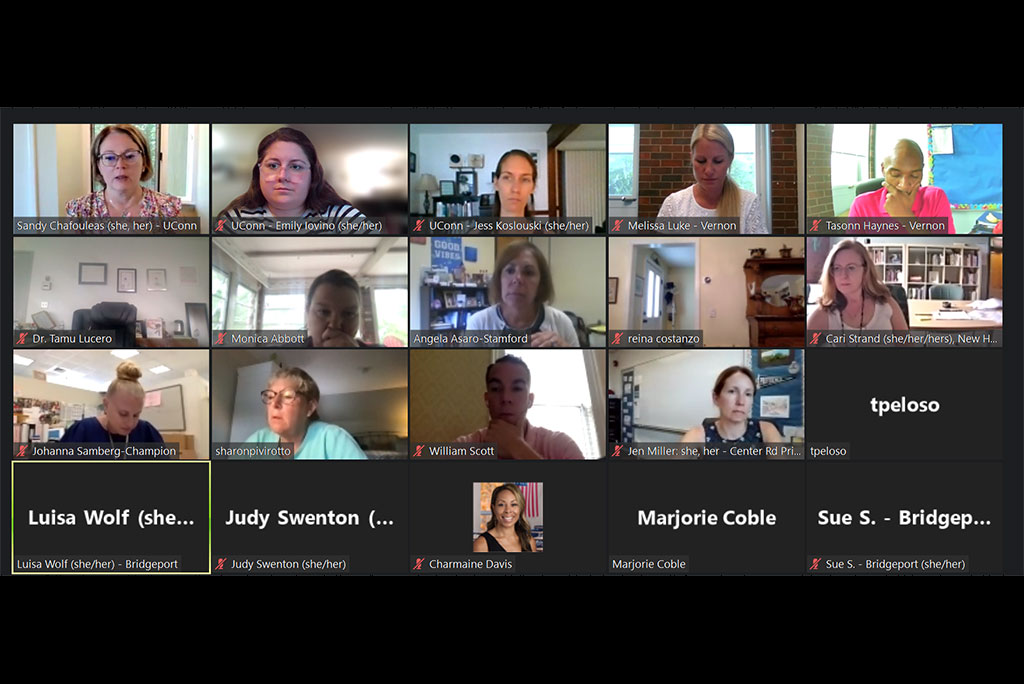
Simple Strategies for School Leaders
Chafouleas outlined simple strategies that school leaders can implement to promote emotional well-being in their students, staff, and themselves as the new school year begins. Each core strategy, known as a “kernel,” is cost-efficient, highly usable, and based on research. They can include anything from sending staff a virtual ‘praise’ postcard to making time to greet students and staff each morning as they enter the building.
Marjorie Coble, an assistant principal at Geraldine Johnson School in Bridgeport, Connecticut, says she, for one, hopes to implement kernels like virtual postcards, breathing strategies, and gratitude circles for school staff this coming school year.
Monthly check-in meetings will continue throughout the rest of the academic year so that Academy participants can maintain and further build their networks for sharing ideas with peers as well as efforts that prove successful in their districts and schools.
“The most valuable aspect about the SEB Academy is the opportunity to connect with other districts for the purposes of networking and learning more about the various approaches to supporting SEB across the state of Connecticut,” says Monica Abbott, the district social and emotional learning coordinator in New Haven, Connecticut. “Hearing from districts such as Stamford, Bridgeport, Vernon allows us to hear different perspectives on similar work. It will provide us future opportunities to share resources and best practices.”
“I am hopeful to network with fellow academy participants to collaborate and support each other through challenges and celebrations of success,” she adds.
“Hearing from districts such as Stamford, Bridgeport, Vernon allows us to hear different perspectives on similar work. It will provide us future opportunities to share resources and best practices.”
— Monica Abbott,
district social and emotional learning coordinator,
New Haven (Conn.) Public Schools
Partnering With Alliance School Districts
CEPARE’s mission centers in part on bringing together scholars and practitioners from diverse areas of expertise in education to work collaboratively in producing high-quality research, evaluation, and policy analysis related to all facets of education.
In seeking to transform the educational experiences and outcomes of traditionally underserved students, CEPARE has partnered with 33 school districts and the Connecticut State Department of Education to foster various collaborative learning, research, and engagement efforts.
Known as the Alliance for Socially and Educationally Transformative Engagement and Research (SETER), this particular partnership focuses on supporting students in Alliance School Districts. Alliance School Districts comprise 42% of the state’s school population, serving more than 200,000 students and upwards of 400 schools in urban, suburban, and rural settings.
Over the coming academic year, CEPARE will be holding additional events, including those designed for the SETER Alliance.
Visit CSCH’s website at csch.uconn.edu for more information and various COVID-19 resources for schools. To learn more about CEPARE, including the SETER Alliance and its other partnerships, go to cepare.uconn.edu.
Young Scholars Engage in Real-World Research With UConn Mentors
 Imagine a group of students not quite out of high school dedicating a considerable chunk of summer break to such activities as interpreting data, carrying out diagnostic coding, and reviewing academic literature — and loving every minute of it.
Imagine a group of students not quite out of high school dedicating a considerable chunk of summer break to such activities as interpreting data, carrying out diagnostic coding, and reviewing academic literature — and loving every minute of it.
Thanks to the Young Scholars Senior Summit (YSSS), a three-week program hosted by UConn since 2018 and funded by the Jack Kent Cooke Foundation, this was the reality for select rising seniors from across the country this past July.
Each summer, the Renzulli Center for Creativity, Gifted Education, and Talent Development connects YSSS student participants with UConn experts who immerse them in university-level research investigations. Led by Lisa Muller, executive program director, and Board of Trustees Distinguished Professor Joseph Renzulli, YSSS this year brought 38 Young Scholars together at two dozen mentorship sites across 21 fields of study. Each student participant spent 20 hours per week assisting with aspects of various research and creative projects.
This summer, YSSS brought 38 Young Scholars together at two dozen UConn mentorship sites across 21 fields of study.
The program “provides a unique, college-based experience that engages the Scholars in high-level learning in areas of their interest,” according to Muller.
Due to the pandemic, activities that typically place on campus occurred virtually this summer. Yet students taking part from as far away as Florida, Kentucky, and Texas still found in this experience a sense of genuine excitement and discovery.
“We loved it. We got to explore our own topics,” says one participant named Paige Lauren. “Who knew there was so much coding involved in biology? I didn’t – but now I’m super excited to learn more.”
Young Scholars Senior Summit Academic Showcase
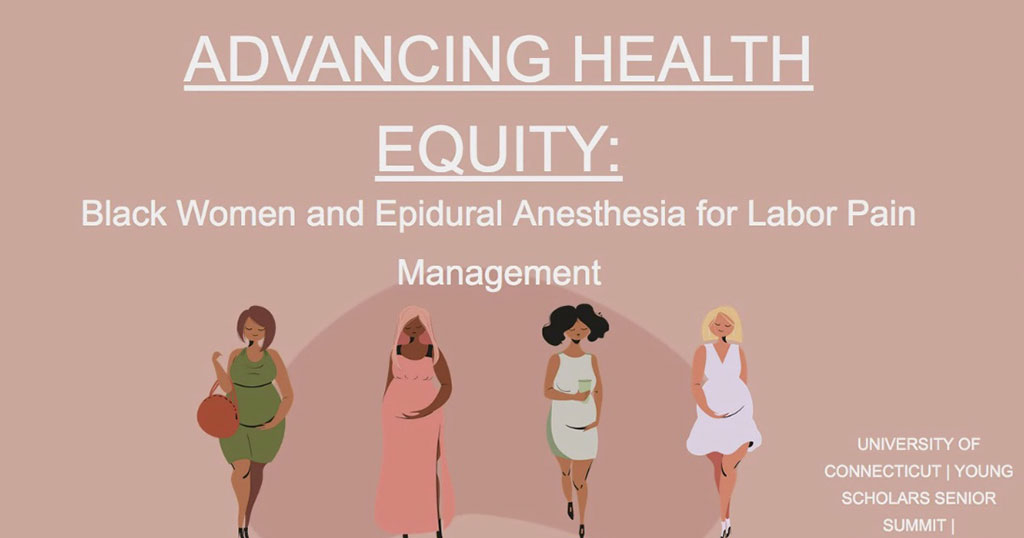
YSSS allows young high-achieving students from families with financial need to work closely with UConn professors and advanced graduate students across a wide range of disciplines, including medicine, political science, linguistics, business, and chemical engineering.
The experience places each Young Scholar with a university mentor or mentors with whom they share a particular area of interest and involves them in authentic, hands-on research efforts.
For one Young Scholar named Genesis, that meant teaming up with Stacey Brown, an associate professor at UConn Health, to work on research exploring racial and ethnic health disparities. With guidance from Virginia Hettinger, associate professor of political science, two other YSSS participants, Cameron and Sarah, examined the press’ role in portraying judicial misconduct and, specifically, its role within a democracy.
“For the research process itself, I have never had an experience with a non-STEM research project prior to this program, so I thought the whole coding practice was super interesting,” says Cameron.
YSSS culminates in a two-day academic showcase during which student participants give formal presentations on their findings. UConn professors and graduate student mentors, members of the Jack Kent Cooke Foundation, Renzulli Center faculty and staff, fellow Young Scholars, and their friends and family members attend these presentations.
“The purpose of the academic showcase is to provide Scholars with an opportunity to be practicing professionals by sharing the work they have completed,” says Muller. “This event is similar to academic conferences, where university faculty and graduate students present their work and results.”
“I can’t compliment everyone enough. Scholars, you did us proud.”
— Giuseppe Basili, Executive Director,
Jack Kent Cooke Foundation
Each of the presentations covered advanced research topics. Among this year’s YSSS presentations were the following:
- Advancing Health Equity: Black Women and Epidural Anesthesia for Labor Pain Management
- Media Coverage of Judicial Misconduct: Fulfilling the Press’ Role in a Democratic Society
- Up in Smoke: The History, Memory, and Erasure of Connecticut’s Tobacco Workers
- Risky Business: How Pharmacy Practice Research Is Addressing Urgent Public Health Epidemics
- Social Policy and the Political Lives of American Teenagers
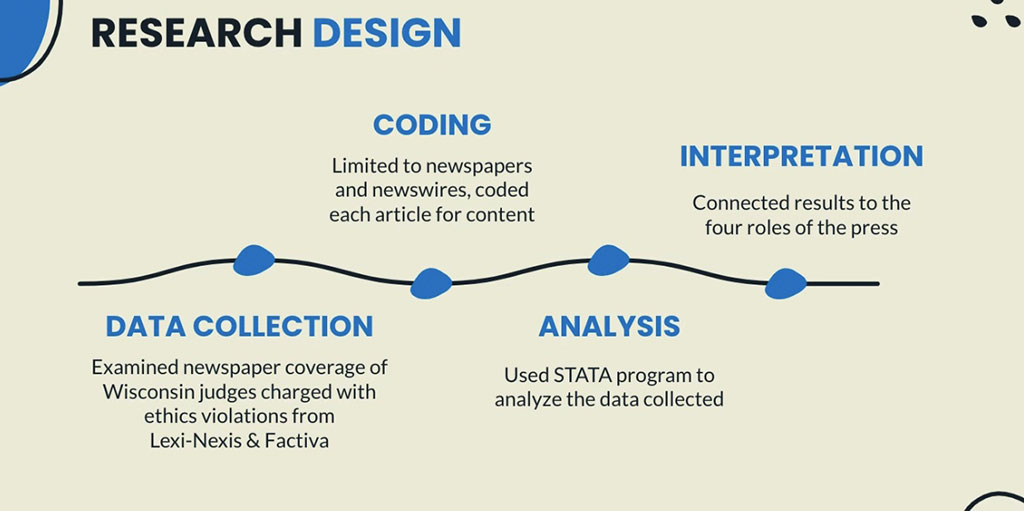
The showcase, held online this past week, offered each Young Scholar time to answer questions from the attendees and hear many congratulatory messages from mentors and peers alike.
Neag School Dean Jason Irizarry was among those to address the Young Scholars at the showcase.
“To all of the student Scholars who have presented over the past two days, it’s clear how much you’ve put into this program; your work is absolutely stellar,” Irizarry told attendees. “I encourage you to keep in touch with your mentors and with all the folks you’ve met throughout this program. We want to be here to help you as you pursue the academic disciplines you are most passionate about. It’s students like you who will be changing our world for the better in the years to come.”
Giuseppe Basili, executive director of the Jack Kent Cooke Foundation, also offered this congratulations at the showcase’s conclusion.
“What I saw across these two days were rigorous explorations, working closely with faculty members,” he said. “I was particularly gratified in listening to some of the mentors and faculty talk about how the work of the Scholars is influencing the way that they’re thinking about their work. I can’t compliment everyone enough – Scholars, you did us proud.”
The Renzulli Center’s leadership team is looks forward to partnering with the Jack Kent Cooke Foundation once again on YSSS in Summer 2022.
Learn more about the Young Scholars Senior Summit.
Haddam-Killingworth Region 17 Hires New Schools Superintendent
The Hour (Neag School alumnus Jeffrey Wihbey was appointed superintendent of schools)
Growing UConn Human Rights Center Honors Chris Dodd, Emphasizes Focus With Name Change
CT Post (Glenn Mitoma, a Neag School faculty member and director of the Dodd Human Rights Impact, is quoted)
Educators, Counselors Focus on Mental Health as Students Return to the Classroom
PBS NewsHour (Neag School alumnus Curtis Darragh is featured)
VIDEO: Academic Affairs Partnership Committee — Fall 2021 Welcome
Student Health and Wellness (Dominique Battle-Lawson and Carlton Jones are committee members)
3 Things To Know About New Browns Consultant Bob Quinn
Browns Nation (Neag School alumnus Bob Quinn is a new Browns senior consultant)
